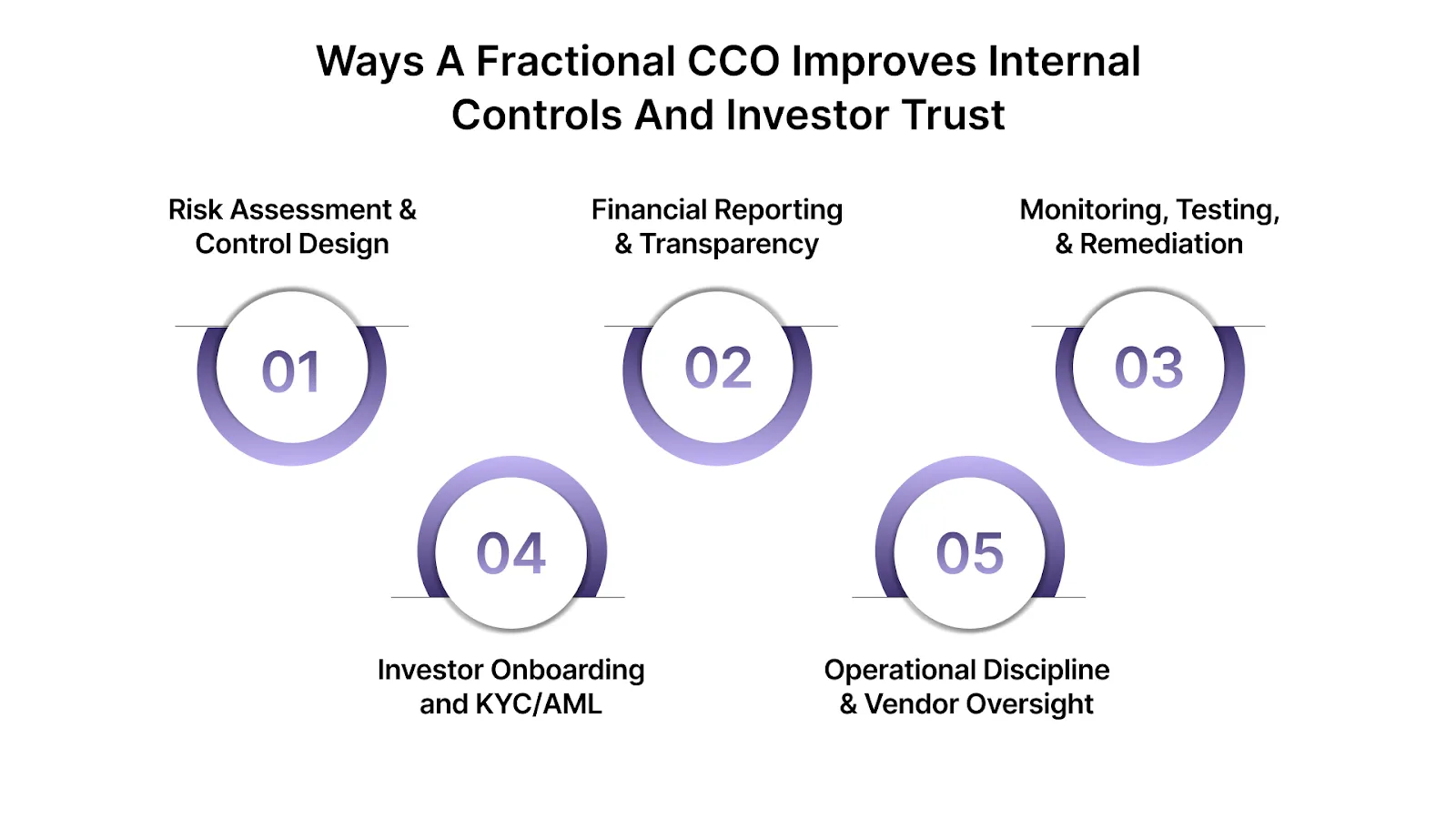Nov 12, 2025
How a Fractional CCO Builds Better Internal Controls (2026)

By Fraxtional LLC
.webp)
Investing in shared property offers access to valuable assets without the burden of full ownership. Yet, managing shared responsibilities, reporting, and compliance often becomes complex as investor participation increases. The absence of strong internal controls can quickly lead to disputes, missed filings, or even financial loss.
Many investors and property operators face challenges related to transparency, accountability, and maintaining consistent processes across different jurisdictions. Without apparent oversight, risks multiply, impacting both asset performance and investor confidence.
In this blog, we’ll explore how internal controls protect fractional real estate investments, why a fractional Chief Compliance Officer (CCO) is important, and how appointing one enhances transparency, compliance, and investor trust.
Key Takeaways:
- Financial Oversight: Ensures transparency, accuracy, and accountability in managing funds.
- Operational Structure: Establishes fair systems for daily property management and shared responsibilities.
- Compliance Protection: Safeguards against legal and regulatory risks through regular checks and reporting.
- Role of Fractional CCO: A part-time expert ensures consistent governance and risk management.
- Cross-Border Compliance: Manages regulatory needs across different regions, maintaining consistency and legal compliance.
Why Internal Controls Matter in Fractional Property Investments

Internal controls play a crucial role in ensuring the security and efficiency of fractional real estate investments. These controls help safeguard assets, structure operations, and prevent risks that could affect investors. Without well-defined controls, disputes, errors, and compliance breaches can occur quickly.
In fractional ownership, the three main pillars of control, financial, operational, and compliance, work together to maintain accountability and investor confidence.
- Financial Controls
Financial controls maintain transparency and accuracy in managing funds. Segregation of duties ensures that approval and execution responsibilities are separated. Dual approvals for major expenses reduce risk, while reconciliations and reserves keep finances organised and traceable.
Transparent accounting gives every investor visibility into property expenses, revenue, and reserves. This transparency builds trust and helps prevent financial disputes.
- Operational Controls
Operational controls ensure fairness in daily operations. Systems like rotating schedules or point-based bookings maintain equal access for all owners. Vendor due diligence ensures fair pricing and quality service from contractors. Clear maintenance records and standardised workflows reduce confusion and prevent disagreements over shared costs and responsibilities.
- Compliance Controls
Compliance controls protect against legal and regulatory risks. These include AML and KYC checks, transparent tax reporting, and adherence to data protection laws such as GDPR. When consistently applied, compliance controls safeguard both investors and property managers, reinforcing accountability and maintaining a credible reputation.
Strong controls need consistent oversight, which is where the fractional Chief Compliance Officer becomes essential.
Also Read: Internal Audit Checklist for Effective Financial Assessment & Control
The Role of a Fractional CCO in Keeping Your Investments Compliant

A Fractional Chief Compliance Officer (CCO) is a senior compliance professional who provides strategic oversight on a part-time or contract basis. This role helps ensure consistent governance, risk management, and regulatory compliance without the cost of a full-time executive. For fractional ownership ventures, a fractional CCO balances flexibility with expert supervision, helping protect assets and investor interests.
Below is a comparison of a fractional CCO and a full-time CCO.
Now that the role is clear, let’s see how a fractional CCO applies their expertise to build stronger internal processes.
Also Read: Chief Compliance Officer: Key Responsibilities, Challenges & Business Impact
5 Ways a Fractional CCO Improves Internal Controls and Investor Trust
A Fractional CCO strengthens every control layer, financial, operational, and compliance, by ensuring they are well structured and continuously tested. This professional oversight helps reduce risks, clarify accountability, and promote investor trust.

- Risk Assessment and Control Design: Identifies financial, operational, and reputational risks early and designs tailored controls to prevent potential issues.
- Investor Onboarding and KYC/AML: Ensures all investors complete standardised checks that meet international AML regulations, maintaining integrity and transparency.
- Financial Reporting and Transparency: Establishes clear accounting systems with segregated accounts, regular audits, and open financial reports for investor review.
- Operational Discipline and Vendor Oversight: Introduces consistent vendor approval processes, service reviews, and transparent operational workflows across all ownership entities.
- Monitoring, Testing, and Remediation: Conducts periodic audits and control tests, identifying gaps and implementing corrective measures promptly to maintain compliance standards.
When fractional ownership extends beyond one jurisdiction, oversight must adapt to different regulations and reporting standards.
Also Read: What a Fractional CCO Does & Why It Matters for Your Business?
Simplifying Cross-Border Compliance for Fractional Real Estate Investors

Cross-border compliance ensures fractional ownership structures meet legal and financial obligations across multiple jurisdictions. Each country has unique rules governing taxation, financial reporting, and ownership rights. A fractional CCO coordinates compliance efforts, ensuring that operations remain consistent and lawful everywhere investments are made.
Below are key areas where cross-border compliance matters most for property investors.
- United States: Compliance includes meeting SEC registration requirements, IRS tax obligations, and state-specific property laws. Disclosure and investor reporting must adhere to national standards and regulations.
- United Kingdom: Adherence to FCA guidelines, Companies Act reporting, and HMRC tax obligations is required. Proper AML and due diligence measures protect both the asset and its investors.
- European Union and Global Frameworks: Investors must comply with the FATF AML rules, the OECD’s tax cooperation framework, and GDPR data protection laws to maintain credibility and legal standing.
- Collaboration Across Borders: A fractional CCO ensures consistent control frameworks across countries, promoting transparency and minimising operational or legal conflicts between jurisdictions.
Once compliance expectations become diverse and demanding, the timing for appointing a fractional CCO becomes a critical consideration.
Also Read: How to Create an Effective Compliance Program: Key Steps & Best Practices
Signs It’s Time to Bring in a Fractional CCO for Compliance Oversight

A Fractional CCO becomes essential as your investment structure grows or expands into multiple regions. As complexity increases, compliance demands multiply, making independent oversight a practical choice. A fractional CCO ensures that every area, finance, operations, and reporting, stays organised and compliant.
Here are common scenarios where appointing a fractional CCO adds clear value:
- Rapid Expansion Across Jurisdictions: Different regions have varied laws, requiring structured compliance oversight for cross-border operations.
- Increased Investor Participation: As ownership groups grow, transparency and consistent reporting become essential for maintaining trust.
- Complex Financial Transactions: Frequent distributions, cross-border payments, or multi-currency accounts demand continuous review to prevent errors or compliance breaches.
- Regulatory Filings and Audits: A fractional CCO ensures filings and documentation meet regulatory deadlines accurately and consistently.
- Reputation and Investor Assurance: Independent oversight signals strong governance, reassuring investors and strengthening the credibility of the ownership group.
Timing matters, but choosing the right CCO partner ensures long-term stability and accountability for your ownership group.
Also Read: When to Hire a Fractional Compliance Officer
Choosing the Right Fractional CCO Partner

Selecting the right fractional CCO partner is key to building consistent compliance across your ownership structure. The ideal partner understands your operations, communicates clearly, and maintains complete independence.
Below are essential factors to evaluate when selecting a fractional CCO.
- Relevant Experience and Sector Knowledge: Select a CCO with direct experience in property and investment compliance who understands the needs of fractional ownership structures.
- Proven Track Record and References: Review case results or references to confirm their reliability and ability to manage complex compliance challenges.
- Independence and Objectivity: Select a CCO that is unaffiliated with property management to ensure impartial oversight.
- Communication and Reporting Clarity: Prioritise partners who deliver clear, actionable compliance reports with transparent updates.
- Scalability and Service Flexibility: Ensure they can adjust support levels as your ownership model expands.
- Technology and Compliance Tools: Confirm the use of reliable systems for audits, monitoring, and reporting to maintain accuracy.
A trusted partner such as Fraxtional can provide experienced fractional CCOs who combine regulatory insight with practical oversight, helping ownership groups build stronger governance and investor confidence.
Hire Fraxtional leadership in North America and beyond!
Conclusion
Strong internal controls protect investor trust and maintain stability in fractional ownership ventures. A fractional CCO ensures accountability, transparency, and consistent oversight across every process.
Fraxtional helps property investors strengthen compliance with experienced fractional C-suite leadership. Their CCOs bring decades of financial and regulatory expertise to safeguard assets and support growth.
Ready to build stronger control and investor confidence? Talk to us today.
FAQs
The five main components of internal control are the control environment, risk assessment, control activities, information and communication, and monitoring. Together, they help ensure assets are protected and operations run smoothly.
A Chief Compliance Officer (CCO) generally oversees the design and monitoring of internal controls but does not typically handle the direct execution of operations. The CCO ensures that the appropriate systems and practices are in place to maintain compliance and governance.
A CCO is responsible for overseeing and managing compliance and regulatory risks within an organisation. This includes ensuring adherence to legal standards, monitoring internal controls, conducting audits, managing risk assessments, and fostering an organisational culture of compliance.
The primary difference between a Chief Compliance Officer (CCO) and a Chief Marketing Officer (CMO) is their focus. A CCO is responsible for regulatory compliance, internal controls, and risk management, while a CMO focuses on developing and executing marketing strategies to promote the business and its products.
A fractional CCO is helpful when a business grows, operates across multiple regions, or faces increasing regulatory demands, offering expertise without the cost of a full-time hire.
blogs
Don’t miss these
Let’s Get Started
Ready to Strengthen Your Compliance Program?
Take the next step towards expert compliance solutions. Connect with us today.




